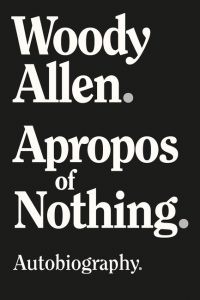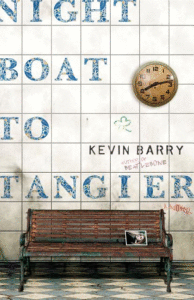
This week’s Fab Five includes Dwight Garner on Woody Allen’s Apropos of Nothing, Julian Lucas on Fernanda Melchor’s Hurricane Season, Francine Prose on Kevin Barry’s Night Boat to Tangier, Wendy Smith on Elizabeth Wetmore’s Valentine, and Katherine Hill on Margaret Atwood’s The Testaments.

“Volunteering to review [Apropos of Nothing], in our moral climate, is akin to volunteering for the 2021 Olympic javelin-catching team. I told my wife and daughter my plan, and they stared at me as if I’d announced my intention to find the nearest functioning salad bar and lick the sneeze guard … I believe Allen’s sexual relationship with Soon-Yi Previn, the adopted daughter of his longtime partner Mia Farrow, which began when Previn was 21, was obviously the perverse act of a man whose brain salts are dangerously out of balance … The accusation that in 1992 he molested his adopted daughter, the 7-year-old Dylan Farrow, is a charge of another magnitude. I believe that the less you’ve read about this case, the easier it is to render judgment on it … I believe that Hachette, the publishing house that acquired and then canceled Apropos of Nothing, behaved cravenly … So kill me now or come along, there’s a book to talk about … Anyone who’s read Allen’s previous books…knows he has an authentic and easygoing voice on the page. That’s true in Apropos of Nothing, too, at least for a while. Later on this book begins to make the clicking sound cars do when the battery has expired … Like many of our fathers and grandfathers, Allen is a 20th-century man in a 21st-century world. His friends should have warned him that Apropos of Nothing is incredibly, unbelievably tone deaf on the subject of women … Nearly every time a woman is mentioned, there’s a gratuitous pronouncement on her looks … The heavy breathing gets more intense as the book moves on … The final third of this book falls apart dreadfully. It’s a rolling of credits, a handing out of goody bags … He can live with being reviled by many, he says, because he doesn’t read the articles. He lives in a bubble. He’s making a new movie.”
–Dwight Garner on Woody Allen’s Apropos of Nothing (The New York Times)
“Hurricane Season belongs to the Gothic-grotesque tradition of the transnational American South. The novel’s tortured self-deceptions and sprung-trap revelations evoke the stories of Flannery O’Connor, or, more recently, the neuroses of Marlon James’s Kingston gunmen in A Brief History of Seven Killings. In an interview about that novel, James spoke about the need to ‘risk pornography’ in the portrayal of violence—and Melchor certainly does. At times, she enters so deeply into the psyche of sexual violence that she skirts the voyeurism risked by any representation of cruelty … The crime is not an act but an entire atmosphere, which Melchor captures in language as though distilling venom. Sometimes, though, this claustrophobic style breaks like a fever, yielding to flights of mesmerically expansive prose … Offering such glints of transcendence at the edge of an ugly killing, Melchor creates a narrative that not only decries an atrocity but embodies the beauty and vitality it perverts.”
–Julian Lucas on Fernanda Melchor’s Hurricane Season (The New York Times Book Review)

“If City of Bohane uses the horrors of an imagined future to reflect on the present moment, Night Boat to Tangier is about the present and the past, about memory and loss, which is partly why it’s a sadder and more beautiful book … Two Irish guys waiting and waiting, more or less in the middle of nowhere—of course one thinks of Beckett and his ability to pack hilarity, despair, resignation, and hope into a single sentence, as well as his delighted familiarity with the body’s unruly rebellions…But in other ways Barry’s project is the opposite of Beckett’s efforts to see how much could be left out: motivation, geography, description. We know so little about Molloy’s appearance that he could be a brain speaking to us from a jar. Barry’s impulse, by contrast, is to put everything in: history, time, place, physical detail…One of the dark jokes running through Beckett’s work is how little his characters remember; Maurice and Charlie’s problem is that they can’t forget … Like The Wire, Night Boat to Tangier—and much of Barry’s work—inspires us to rethink our ideas of character, of compassion and forgiveness. Without romanticizing crime, they humanize the criminal. Enabling us to ‘get the speech,’ to see beneath the surface and into the souls of the losers, the lovelorn, the kind of guys we’d cross the ferry terminal to avoid—surely that’s one of the great things that a work of art can do.”
–Francine Prose on Kevin Barry’s Night Boat to Tangier (The New York Review of Books)
“Valentine is an angry novel, a blast of feminist outrage against a toxic culture that breeds racism and violence against women. The narrative hurtles forward with urgency of a thriller, and it emulates the darkest spy fiction by making it painfully apparent that the good guys are at least as likely as the bad guys to be punished. Elizabeth Wetmore’s mingled love and fury for her native West Texas electrifies her prose; despite its grim subject matter, her first novel is exhilarating to read, because the characters are so alive, the drama that engages them so compelling … interconnected stories play out against the backdrop of a harsh, lonely land lovingly evoked by Wetmore … She’s not painting a pretty picture here, but it’s palpably real, and her characters’ grit and resilience infuse the novel with a spirit of hard-won resolution … a gripping, galvanizing tale from a strong new voice in American fiction.”
–Wendy Smith on Elizabeth Wetmore’s Valentine (The Boston Globe)
“Atwood used to dismiss the notion that her fiction was ‘secretly telling the truth,’ but The Testaments suggests she’s changed her mind … The Testaments offers a tour of the power structures that Offred, in her confinement, can’t see. Yet its vision of those structures, provocative though it is, flattens both her fiction and our shared reality, doubling down on the original novel’s least compelling arguments while abandoning its most interesting speculations … The original novel is a portrait of confinement, following Offred’s delimited gaze as she sits around waiting to get pregnant … The Testaments, by contrast, is all heroic action. This is, in part, because Atwood has widened her purview to three non-Handmaid narrators. But it’s also because she’s grown less interested in speculation … Whereas Handmaid is interested in the minds of Offred and the women and men who surround her, in The Testaments we are presented with one-sided characters. The women of Gilead are either innocent or conniving, and the men are all cartoonish sadists, literal wife killers, and child rapists. The problem goes beyond flat writing. In The Testaments, Atwood is no longer speculating about a possible future so much as commenting on what she believes to be an inescapable present, one in which men are simpleton oppressors whom women can either enable or resist. Yes, Atwood seems to be telling us, it could happen here; in fact, it’s happening under Trump, just as she predicted it would. And without great feats of courage, we will never drive the bastards out …Bring an aging leader together with a couple of feisty teens; use the enemy’s own logic to expose the truth of their crimes. If only it were so simple. The Testaments, in the end, is too much a fantasy to offer us much guidance in the age of Trump and too literal to offer space for solace and speculation.”
–Katherine Hill on Margaret Atwood’s The Testaments (The Nation)

